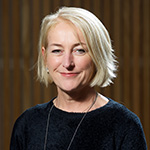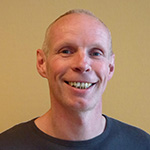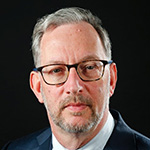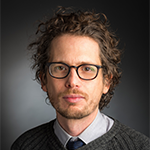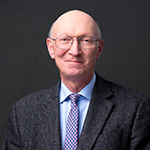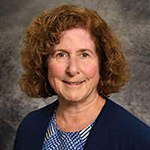Our eminent international Scientific Advisory Board (SAB) consists of scientists and other professionals with an interest in early cancer detection. The SAB meets annually and provides important strategic leadership for the Early Cancer Institute.
Scientific Advisory Board members
| Caroline Haughey, OBE KC | Sara Hiom, VP, NHS Implementation & External Affairs, GRAIL Europe | Professor Jos Jonkers, Division of Molecular Pathology, Netherlands Cancer Institute | |
| Professor Harry de Koning, Deputy Head and Professor of Public Health and Screening Evaluation, Erasmus University, Rotterdam |
Professor Dan Landau, Associate Professor of Medicine, Weill Cornell Medicine and Core Member, New York Genome Center |
Dr Jason Mellad, CEO and Co-Founder, Start Codon | |
|
Professor Joellen Schildkraut, Jules and Uldeen Terry Distinguished Professor of Women's Health, Dept of Epidemiology, Rollins School of Public Health, Emory University | Professor Manuel Serrano, Principal Investigator, Altos Labs |
Biographies
Caroline Haughey, OBE KC
Caroline was appointed Queen’s Counsel in 2018 and brings a wealth of real-world experience to the Early Cancer Institute Scientific Advisory Board. While her professional areas of expertise are in modern slavery and trafficking law, Caroline has also developed experience in disclosure of nationally and internationally obtained material and medical disclosure, as well as phone and computer evidence and analysis. On a personal level Caroline understands what it is to live with knowledge of cancer risks for breast cancer through genetic testing and the kind of empowerment and complex decision making that follows.
Sara Hiom, VP, NHS Implementation & External Affairs, GRAIL Europe
Sara has long been a passionate spokesperson for early cancer diagnosis having spent over 20 years with Cancer Research UK as the Director responsible for the charity’s Early Diagnosis strategy, cancer intelligence, clinical and patient engagement. In this role she worked closely with the Department of Health, NHSE (and National Cancer Intelligence Network as was) and a host of other charities to champion earlier diagnosis of disease.
In 2020 she moved to the newly formed GRAIL Europe where she continues her work in cancer early detection, implementation, stakeholder and clinical engagement.
Jos Jonkers, Senior Group Leader, Division of Molecular Pathology, Netherlands Cancer Institute (NKI)
Jos Jonkers completed his PhD and postdoctoral research in the group of Dr Anton Berns at the Netherlands Cancer Institute (NKI). Following his second postdoc in the group of Dr Allan Bradley at the Wellcome Sanger Institute he started his own research group at the NKI in 2003. His research group studies human breast cancer using genetically engineered mouse models and patient-derived xenograft models. He is currently a Senior Group Leader in the Division of Molecular Pathology at NKI, Senior Investigator at the Oncode Institute, Affiliate Professor of Molecular Experimental Oncogenetics and Cancer Therapeutics at Leiden University, and elected member of the European Molecular Biology Organisation (EMBO).
Dan Landau, Associate Professor of Medicine, Weill Cornell Medicine and Core Member, New York Genome Center
Dan Landau, MD, PhD is Associate Professor of Medicine at Weill Cornell Medicine and a Core Member of the New York Genome Center. He is an oncologist whose long-term goal is to develop novel approaches to address cancer evolution as a central obstacle to cure. Dr. Landau has made seminal contributions to our understanding of cancer biology, developing novel genomics approaches to integrate genetic and non-genetic determinants of cancer evolution. He has also pioneered innovative genomics technologies for the study of cancer evolution, including for liquid biopsy treatment monitoring. His research group is funded by the NCI, NHLBI and NHGRI, and his work has led to recognition and awards including Stand Up to Cancer, Burroughs Wellcome Fund, Vallee Scholar, Mark Foundation Emerging Leader Award and the NIH Director’s New Innovator Award.
Harry de Koning, Deputy Head and Professor of Public Health and Screening Evaluation, Erasmus University, Rotterdam
Harry has a wealth of experience in designing, running and evaluating large-scale, population-based, randomised controlled screening trials. He has been involved in assessing many national and international screening programs and clinical tests including one of the world’s first evaluations of the cost-effectiveness of breast cancer screening. Harry is also responsible for guiding public health policies on screening and primary prevention using predictions of favourable and unfavourable effects and the cost of interventions, based on micro-simulation modelling of the natural history of disease, risk-prediction modelling and cost-effectiveness and cost-utility analyses. In 2022 he co-chaired an evidence review on ‘Cancer Screening in the European Union’, the recommendations from which will be used to improve and update cancer screening policy across the EU.
Jason Mellad, CEO and Founder, Start Codon
Jason is a scientist entrepreneur passionate about translating innovative technologies into better patient outcomes. As CEO and co-founder of Start Codon, a Cambridge (UK)-based venture builder, he aims to identify the most disruptive healthcare founders and innovations from across the UK, seed fund them and leverage the exceptional resources of the Cambridge cluster to de-risk and drive the success of their start-ups.
Previously he was CEO of Cambridge Epigenetix and Business Development Manager for Horizon Discovery’s diagnostics division. He also served as an associate at Cambridge Enterprise, the technology transfer office of the University of Cambridge.
Lord Prior of Brampton, Deputy Chairman UK and Global Senior Advisor at Lazard
Following education at Cambridge and subsequent qualification as a Barrister, David Prior held a number of senior positions within the industrial sector, including Commercial Director of British Steel.
In 1997 he was elected as MP for North Norfolk and served as Chairman of Norfolk and Norwich University Hospitals NHS Foundation Trust from 2002 – 2012 before becoming Chairman of the Care Quality Commission. In 2015, he was appointed Parliamentary Under Secretary of State for Health and created a Life Peer. In December 2016, he was appointed as Parliamentary Under Secretary of State at the Department of Business, Energy & Industrial Strategy, with specific responsibility for developing industrial strategy. He stepped down from this role in October 2017 to become Chairman of University College London Hospitals and subsequently became Chairman of NHS England and a member of the UK Life Sciences Council from November 2018 to March 2022.
He continues to advise the government on Life Sciences and is an advisor to Healthcare UK.
Joellen Schildkraut, Jules and Uldeen Terry Distinguished Professor of Women's Health, Dept of Epidemiology, Rollins School of Public Health, Emory University
Joellen is a cancer epidemiologist and the Jules and Uldeen Terry Distinguished Professor of Women's Health in the Department of Epidemiology, Rollins School of Public Health, Emory University. Part of her research focus is on familial cancer and, in particular, the genetic relationship between breast and ovarian cancers. Joellen was one of the first epidemiologists to understand and promote the concept that histological and molecular subtypes of cancer may have distinct etiologies. Her major contributions have been made to the understanding of traditional epidemiologic risk factors and the genetic and molecular subtypes of ovarian cancer. She teaches cancer epidemiology to graduate students at Emory University.
Manuel Serrano, Principal Investigator, Altos Labs
Manuel Serrano is internationally recognised for his discovery of the master senescence gene P16 and the phenomenon of oncogene-induced senescence.
In Spain his career saw him lead laboratories at the National Centre of Biotechnology (CNB), the Spanish National Cancer Research Centre (CNIO), both in Madrid and, from 2017, the Institute for Research in Biomedicine (IRB) in Barcelona.
In 2022 Manuel moved to cellular rejuvenation technology specialist Altos Labs’ newly established Cambridge Institute of Science in the UK. Currently, his team is focused on the identification of intermediate reversible states of reprogramming and their relevance for tissue rejuvenation and cancer prevention.


